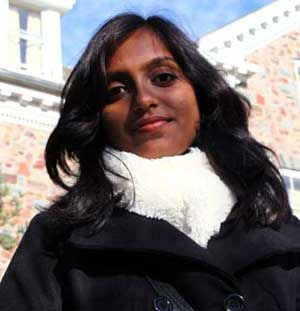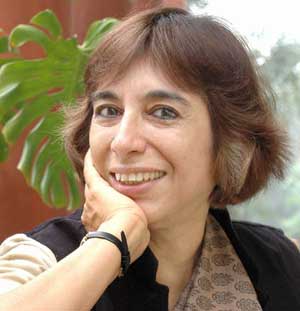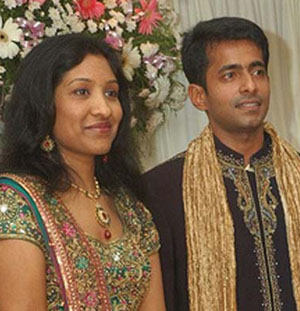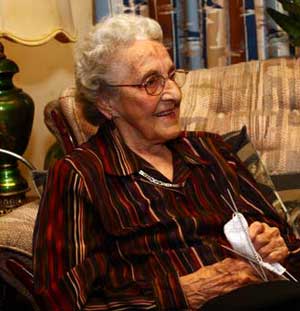 |
| Students decorated each other's hands with mehndi during Diwali celebrations last November. (Bruce Bottomley Photo) |
Hands extending in friendship, students take turns decorating one anotherâs palms with intricate patterns of Mehndi. The henna designs add some Indian culture to the Student Union Building during Diwali celebrations organized by the Indian Subcontinent Students Association (INDISA).
The number of students from India is growing at ±«Óătv. There are 174 students at the university this year, more than double the number from two years ago.
Recently, ±«Óătv President Tom Traves was a member of the largest group of Canadian university presidents to go to India. The mission, organized by the Association of Universities and Colleges of Canada, raised Canadaâs profile in a country where an immense and youthful population makes the demand for post-secondary education so great it canât be met within its own geographic boundaries.
Come to ±«Óătv
âThere are literally hundreds of thousands and, eventually, millions of Indian students who will go abroad, and, as their national wealth increases, they will have greater capacity to go abroad,â Dr. Traves says. âSo, clearly, we have an interest in having some of those students â the best among them â come to Canada and come ?to ±«Óătv.â
This initiative illustrates an overall increase in international enrolment at ±«Óătv which has reached 1,770 students representing more than 110 countries. Significant enrolment increases were recorded from the Middle East (especially Saudi Arabia) and in Asia (particularly China).
±«Óătvâs strategic student recruitment initiatives are advancing the universityâs efforts to expand its presence in markets across Canada and around the world. This is especially important given the declining number of Atlantic Canadian students.
Ă sa Kachan, assistant vice-president enrolment management and registrar, addresses the benefits of a multicultural learning environment.
âI think one of our goals in internationalizing the university is to create opportunities for diverse viewpoints in the classroom, allowing students, whether from Truro or Toronto or Bangkok, the opportunity to meet people from around the world and engage with them academically and socially,â says Ms. Kachan.
First-rate minds
Dr. Traves highlights the value of a global perspective for international and Canadian students.
âFor the international students coming here, on many, many occasions Iâve had conversations where people have said, âThis transformed my life. It taught me to see the world in different ways, it opened up possibilities to me that I never would have imagined were available and it gave me some insight into career options. It set me up as it were for the way the rest of my life evolved.ââ
In turn, international students contribute greatly.
âThey bring a wealth of personal experience, in a sense they embody their national experience. So, in the first instance, they enrich the campus environment,â says Dr. Traves. âThe second component is that weâre very fortunate to attract really capable students. Whenever you have a first-rate mind from any environment, they raise the bar?for everybody.â
Year of India in Canada launched
âWhere one studies and how one studies are part of oneâs cultural heritage,â writes Manju Kapur (MAâ72), author of The Immigrant. âAnd, of course, to study in an environment completely different from your own means an opening of the eyes, an expansion of the mind.â  Ponmalar Pandian
Ponmalar Pandianâs very first plane trip was from Chennai (formerly Madras) to Halifax. The pain of leaving her family tempered the elation she had felt when she was accepted into ±«Óătvâs master of engineering (Internetworking) program. Though she still misses her family â she uses Skype to talk with them daily, sharing what she has done and seen â she is happy to be here. âStudying abroad has always been my dream because itâs a total shift from who you were to what youâre going to be. I believe this,â she says. âThis is the place where you get international exposure, because when in India you get along with all kinds of Indian people, fine, thatâs a great environment, but now Iâm here in a multicultural nation where I see people from every country.â Ms. Pandian says she has also experienced a new level of independence. â(In India), you donât just live for yourself, you live for your family, you live for the society. But here, you get personal freedom. You can live for yourself, for your happiness, and no one is going to stop you. No oneâs going to question you. And I love this.â Manju Kapur
When asked to sum up her experience as a graduate student at ±«Óătv, Manju Kapur reflects back. âWhat can I say? Such experiences are impossible to sum up, they are so far reaching and so intense. It was the first time I had been on my own. It was a time of great loneliness as well as great freedom. I was forced to see myself differently because I was in a different place, because in fact I was now being seen differently. This is the issue, isnât it? To what extent does the way you are perceived affect your own self-perception?â Ms. Kapur brings this insightfulness to her fourth and latest novel, The Immigrant, in which Halifax and ±«Óătv figure. The novel was shortlisted for the DSC Prize for South Asian Literature. (Difficult Daughters was a Commonwealth Writersâ Prize Best First Book (Eurasia) winner and an Indian bestseller.) Nearly 40 years have gone by since Ms. Kapurâs ±«Óătv days, yet her recollections remain strong. âEducation, social, intellectual, exposure to a different way of life, being thrown upon myself, survival, a brilliant library open well into the night, unfettered access to books, emphasis on personal academic contribution, meeting people I would never have met otherwise, both Indian and Canadian, a beautiful campus, freedom to walk everywhere, looking at possibilities open to women â ±«Óătv meant all that.â Philip Kuruvilla
Philip Kuruvilla (MECâ08), from Kerala, was working in IT in India when he chose ±«Óătv for its multidisciplinary master of electronic commerce program. A welcome bonus was the universityâs multicultural environment. âI took this course on e-government and we had people from Botswana, we had people from Ireland, and it was very enriching to see how e-government initiatives are carried out in those countries,â says Mr. Kuruvilla. Outside the classroom, he learned to be more self-reliant. âCooking was definitely one thing, living on a shoestring budget, then there is the whole, youâre suddenly immersed in a culture that is very different. So you have to come out of your cocoon.â He skied, went to Cape Breton â âit was breathtakingâ â and experienced Hurricane Juan. He says the greatest similarity between Halifax and India is that âpeople love life. That celebration of life whether youâre rich or poor, whatever condition youâre in, Iâve seen that uniquely in both places.â Today, Mr. Kuruvilla is an IT analyst in Toronto, where he lives with his wife, Nicy Kurian, an IT consultant also from Kerala. Although their work days are long, Mr. Kuruvilla remains connected with his friends, most of whom are also ±«Óătv alumni. âItâs not that we reminisce every time we meet, but there is that bonding that we had, that shared past....Thatâs probably what keeps it together.â
|




